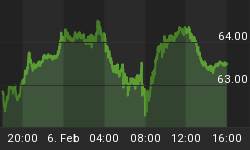Pity poor Mongolia, bereft of fiscal resources, caught between the ambitions of its superpower neighbors, Russia and China.
Ulaan Bator's situation is akin to interwar Poland, dexterously attempting to reconcile its foreign policy between the USSR's hammer and Nazi Germany's hard place. Who will ultimately benefit is anyone's guess, but the country's nascent energy and mineralogical riches have opened the land of Genghis Khan to a fierce bidding war those ultimate outcome is unclear at best.
The nation is essentially empty, its 2.8 million citizens producing an average population density of just over 1 person per sq. km.
That said, the country's mineralogical riches are more than impressive. More importantly for global mining interests, Mongolia was a Soviet satrapy from 1924 until the 1991 implosion of the USSR and those reserves remained offline.
Until now.
Whaddya looking for? Mongolia's mining sector has some of the world's richest deposits of gold and copper, uranium, coal, fluorspar as well as (rare earth elements) RREs such as tantalum, niobium, thorium, yttrium and zircon. According to a 2009 estimation by the U.S. Geological Survey, Mongolia has 31million tons of rare earth reserves, or 16.77 percent of the world's total, exceeded only by China.
Oh, and coal.
Erdenes, a state firm is overseeing the Tavan Tolgoi ("Five Hills") massive coal deposit located in the east Tsankhi area of Mongolia's Gobi desert, estimated to hold over 7.5 billion metric tons of coking coal, essential for making steel, and the currently world's biggest untapped deposit.
Where's it gonna go?
Potential suitors include Russian, Chinese, Japanese and South Korean firms, while representatives from 20 global investment banks jetted into sunny Ulaan Bator to make their pitches.
While Mongolia's economy was traditionally based on herding and agriculture, neighboring China's rising demand for minerals has underpinned its current mining boom, and Beijing would undoubtedly happily buy virtually all of Tavan Tolgoi's output.
But, business, is business, and Mongolia is currently weighing all offers.
In 2006 Mongolia's Mineral Law was amended to increase government royalties and licensing fees, reduce tax incentives, set duration terms for exploration licenses, and provide for up to 50 percent government ownership of strategically important resources when jointly funded by the state and private investors. On 25 August 2009 the Ulsyn Ikh Khural (State Great Hural, or Parliament) finally repealed the 68 percent windfall profit tax, effective from January 1, 2011, setting the stage of massive foreign investment.
Since April 2010 Mongolia's benchmark MSE Top 20 Index has been the world's best performer and its currency, the tugrik, the fifth-biggest gainer against the dollar. The International Monetary Fund says that Mongolia's economic growth may surge to 23 percent in 2013, more than twice the forecast expansion in China.
In June the Mongolian government gave each citizen 538 shares in the upcoming Erdenes-Tavan Tolgoi IPO. If the IPO hits its anticipated $10 billion, each Mongolian shares would be worth about $360.
The local populace will be watching the Tavan Tolgoi negotiations closely, as Mongolia is a country where the CIA estimates that more that 36 percent of the population lives below the poverty line, with an annual per capita income of $2,900. After all, in a democracy, a 2.8 millionth share in a site estimated to be worth more than $48 billion is nothing to sneeze at, and is cheaper than mounting the pony and replaying the campaigns of Genghis Khan to secure booty.
By. John C.K. Daly of OilPrice.com















